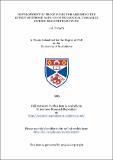Development of procedures for assessing the effect of stroke rate on physiological variables during ergometer rowing
Abstract
To determine the effect of stroke rate on lactate concentration, oxygen consumption and heart rate during ergometer rowing, pilot investigations were necessary to clarify methodological procedures. To examine the validity of using blood taken from the toe for the assessment of plasma lactate concentration, values were compared with those taken from the fingertip and earlobe. Subjects (n=9) exercised at work intensities corresponding to 76.4+/-6.1% and 91.4+/-4.7% of estimated heart rate maximum for 4 minutes. No significant differences (p<0.05) were found between any of the sites at either work intensity. The toe has the advantage that repeated blood samples may be removed without interrupting the rowing action. A test to establish maximum oxygen consumption (VO2max) was developed for the Concept II rowing ergometer and examined for validity and reliability in 31 rowers. Re-test data for VO2max proved reliable (r=0.86), although not all of the criteria for ascertaining whether a VO2max value had been achieved, were satisfied. This was due to differences in response to maximal exercise among individuals. A final respiratory exchange ratio (RER) of 1.10 rather than 1.15 was recommended as a criterion for establishing VO2max for club level rowers. To determine the highest level of work that can be sustained during rowing exercise without an increase in plasma lactate concentration, 30 subjects exercised for 10 minutes at work intensities corresponding to 75%, 85% and 95% VO2max. From the results, it was hypothesised that subjects could work for 7 minutes at 80% VO2max without significant differences occurring in plasma lactate concentration taken in the last minute of exercise of successive tests. These values were confirmed with a further study on 11 subjects. A method of directly measuring mechanical variables from the ergometer was initiated. It was hypothesised that the data collected from this and preceding studies could be used for further investigation into the effect of stroke rate on both physiological and mechanical variables.
Type
Thesis, PhD Doctor of Philosophy
Collections
Items in the St Andrews Research Repository are protected by copyright, with all rights reserved, unless otherwise indicated.

